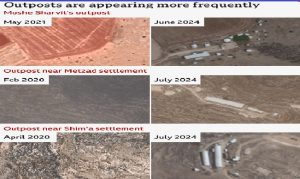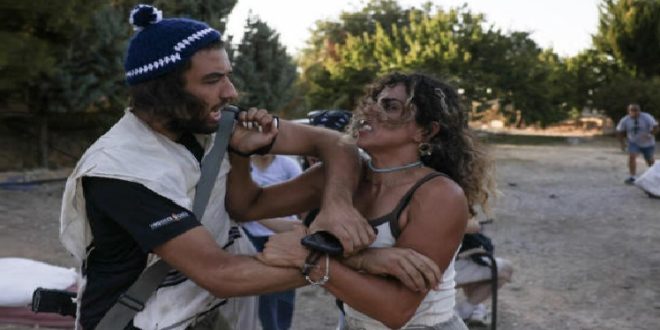04-09-2024
OCCUPIED WEST BANK: Last October, Palestinian grandmother Ayesha Shtayyeh says a man pointed a gun at her head and told her to leave the place she had called home for 50 years.
She told the BBC the armed threat was the culmination of an increasingly violent campaign of harassment and intimidation that began in 2021, after an illegal settler outpost was established close to her home in the occupied West Bank.
 The number of these outposts has risen rapidly in recent years, new BBC analysis shows. There are currently at least 196 across the West Bank, and 29 were set up last year more than in any previous year.
The number of these outposts has risen rapidly in recent years, new BBC analysis shows. There are currently at least 196 across the West Bank, and 29 were set up last year more than in any previous year.
The outposts which can be farms, clusters of houses, or even groups of caravans often lack defined boundaries and are illegal under both Israeli and international law.
But the BBC World Service has seen documents showing that organizations with close ties to the Israeli government have provided money and land used to establish new illegal outposts.
The BBC has also analyzed open source intelligence to examine their proliferation, and has investigated the settler who Ayesha Shtayyeh says threatened her.
Experts say outposts are able to seize large swathes of land more rapidly than settlements, and are increasingly linked to violence and harassment towards Palestinian communities.
Official figures for the number of outposts do not exist. But BBC Eye reviewed lists of them and their locations gathered by Israeli anti-settlement watchdogs Peace Now and Kerem Navot – as well as the Palestinian Authority, which runs part of the occupied West Bank.
We analyzed hundreds of satellite images to verify that outposts had been constructed at these locations and to confirm the year they were set up. The BBC also checked social media posts, Israeli government publications and news sources to corroborate this and to show that outposts were still in use.
Our analysis suggests almost half (89) of the 196 outposts we verified have been built since 2019.
 Some of these are linked to growing violence against Palestinian communities in the West Bank. Earlier this year, the British government sanctioned eight extremist settlers for inciting or perpetrating violence against Palestinians. At least six had established, or are living on, illegal outposts.
Some of these are linked to growing violence against Palestinian communities in the West Bank. Earlier this year, the British government sanctioned eight extremist settlers for inciting or perpetrating violence against Palestinians. At least six had established, or are living on, illegal outposts.
A former commander of the Israeli army in the West Bank, Avi Mizrahi, says most settlers are law-abiding Israeli citizens, but he does admit the existence of outposts makes violence more likely.
“Whenever you put outposts illegally in the area, it brings tensions with the Palestinians… living in the same area,” he says.
One of the extremist settlers sanctioned by the UK was Moshe Sharvit, the man Ayesha says threatened her at gunpoint. Both he and the outpost he set up less than 800m (0.5miles) from Ayesha’s home, were also sanctioned by the US government in March. His outpost was described as a “base from which he perpetrates violence against Palestinians”.
“He’s made our life hell,” Ayesha says, who must now live with her son in a town close to Nablus.
Outposts lack any official Israeli planning approval unlike settlements, which are larger, typically urban, Jewish enclaves built throughout the West Bank, legal under Israeli law.
Both are considered illegal under international law, which forbids moving a civilian population into an occupied territory but many settlers living in the West Bank claim that, as Jews, they have a religious and historical connection to the land. (BBC)
 Pressmediaofindia
Pressmediaofindia




